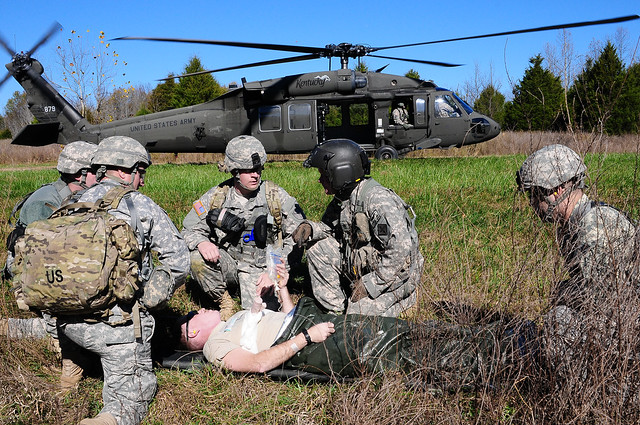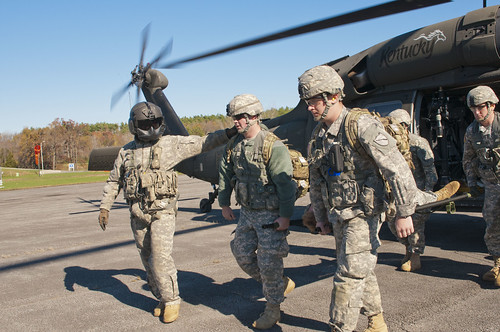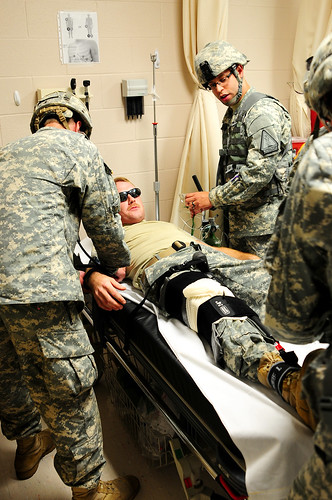Kentucky National Guard Staff Report
[caption id="" align="aligncenter" width="572"]

Flight Medic Staff Sgt. Jeremy Lowe with the 2nd Battalion, 238 Aviation Regiment consults with a medic team as they prepare to load a simulated casualty aboard a UH-60 Black Hawk MEDEVAC helicopter for transportation to a field hospital located at the Wendell H. Ford Regional Training Center in Greenville, Ky., Nov. 14. This exercise was a special addition to combat medic sustainment training that provided medics with real world experience working with flight medics and MEDEVAC flight crews that would only be available when deployed overseas. (U.S. Army National Guard photo by Sgt. 1st Class Aaron Hiler)
GREENVILLE, Ky. -- When things go wrong in the field, Soldiers turn to the so-called “Angels of the Battlefield.” These highly-trained combat medics are there for when the worst case scenario unfolds, whether on the field of battle or during training exercises, whenever Soldiers are injured or wounded.
In order to stay up-to-date on the best trauma practices, medics receive refresher training every two years. Luckily for medics of the Kentucky National Guard, the refresher training is offered at the Wendell H. Ford Regional Training Center in Greenville.
“This class provides the medics with all of the continuing education units required to re-certify,” said Staff Sgt. Donald King, a combat medic instructor for the 238
th Regional Training Institute.
“This course also gives them additional training that they cannot get in their units or elsewhere.”
[caption id="" align="alignright" width="381"]

A flight medic with Charlie Company, 2nd Battalion, 238th Aviation guides combat medics from a UH-60 Black Hawk during the medics' recertification training at the Wendell H. Ford Regional Training Center in Greenville, Ky., Nov. 14, 2015. As part of the training the medics were given scenarios loading and unloading patients from the aircraft to familiarize them with the dangers of doing their job around aircraft. (U.S. Army National Guard photo by Sgt. 1st Class Aaron Hiler)
Click here for more photos.
Following the completion of the course, Soldiers received familiarization training on medical evacuation (MEDEVAC) flight operations . The RTI coordinated with aviation assets from Kentucky's 2nd Battalion, 238th Aviation Regiment to provide MEDEVAC helicopter support as a culminating event to the course.
“The purpose of this exercise is to give these medics experience with aviation flight medics and MEDEVAC aircrews so they are better prepared to evacuate patients to the next level of medical care,” said Sgt. Daniel Diehl, combat medic instructor. “This is training that they would otherwise only receive when deploying overseas.”
The medics performed triage on simulated casualties at a field aid station and called in nine-line MEDEVAC requests. From that point a UH-60 Black Hawk helicopter arrived to transport their patients to a field hospital.
Soldiers and trainers at Kentucky's RTI are used to thinking outside the box and developing methods to improve training and bring attention to the possibilities at the Wendell H. Ford Regional Training Center. Training coordinator, Sgt. 1st Class John Riggi said this medic course was just one example of that type of thinking.
"It's rare to have a portion of this kind of training include actual medical evacuation by aircraft. Thankfully we were able to coordinate with our aviation assets in the state to make it happen," said Riggi. "And I believe it was certainly a highlight of the course and a critical piece of training that will make these medics better."
[caption id="" align="alignleft" width="254"]

Sgt. Orlando Gonzalez reviews a simulated casualty's status with a doctor at a field hospital during a practical exercise conducted as part of Combat Medic Sustainment training at the Wendell H. Ford Regional Training Center in Greenville, Ky., Nov. 14, 2015. According to the sustainment training staff this practical exercise and the use of UH-60 Black Hawk MEDEVAC helicopters is unique to the Kentucky National Guard. (U.S. Army National Guard photo by Sgt. 1st Class Aaron Hiler)
“This is the best medic training I’ve ever received,” said Sgt. 1
st Class Kirby Jones. Jones, a recruiter for the Kentucky Recruiting & Retention Battalion, took the course to re-certify his combat medic status.
“I’ve been to four previous medic refresher courses at Fort Knox and Fort Campbell and other locations,” he said. “This class has been better by far because of the level of interaction with the instructors and the shared experiences of the other medics. No ‘death by PowerPoint’ here.”
The training also benefited the aviation Soldiers of Detachment 1, Charlie Company, 2/238th. Staff Sgt. Lowe, Flight Medic Standardization NCO for the unit said the training opportunity provided the crew a chance to test their own response and how they work with ground medics in such situations.
"This assists our mission by saving precious time correcting mistakes in patient packaging during an actual lifesaving mission," said Lowe. "The medics that were involved in this training performed admirably, they were given difficult scenarios in very different environments than they were used to working in. I was very impressed by their hard work."
A variety of courses are taught at the training site which has become not only a convenience for Kentucky Soldiers but a very cost-effective benefit for the state. With the addition of a realistic MEDEVAC exercise with aircraft, the course garnered the attention of Fort Sam Houston, home of the U.S. Army's combat medic school.
"A representative from the Army's Emergency Medical Service program was here to see how we do things in Kentucky, and I believe he was impressed," said Riggi. "The more unique and high-quality training we can conduct here, the more people will notice what the RTI can do. And that could lead to even more training opportunities and benefits for the Kentucky Guard."